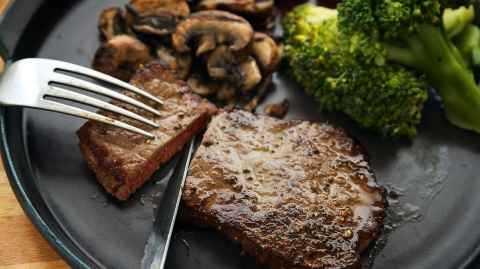Could Wagyu beef protect against heart disease?
14 January 2019
As barbeque season gets into full swing, New Zealand researchers are investigating whether certain kinds of red meat could actually protect against heart disease.

Researchers have recruited men aged 35-55 willing to eat free meat three times a week for eight weeks in the name of science. Participants are supplied with either grass-fed Wagyu beef, grain-finished beef or soy-based meat alternative (they can’t choose which).
The study is looking at how the complex lipids (fats) in high quality, unprocessed red meat affect heart health, using the vegetarian protein group as a control. It follows earlier evidence that eating Wagyu beef in moderation may help protect against heart disease. The beef, from specially bred and fed cows, is rich in a fat called conjugated linoleic acid, or CLA, and several other so-called ‘good fats’.
Study lead Professor David Cameron-Smith, from the University of Auckland-based Liggins Institute, says red meat is an excellent source of protein and rich in vitamins and minerals, such as iron, but has been linked to an increased risk for heart disease and colon cancer.
Almost all of the evidence for those links comes from large epidemiological studies, which involve identifying associations between people’s self-reported diet and their health status years later.
Grass-fed cows naturally have more omega-3 and other ‘good fats’ like DPA and CLA, which have anti-inflammatory properties.
“The trouble is, it’s hard to tell whether these associations are linked to meat, or other diet and lifestyle factors,” says Professor Cameron-Smith.
“Another issue is that many studies do not separate out the effects of fresh and preserved, or processed, red meat. The link to colon cancer is clear for processed meat. But very few scientific studies – this is the first in New Zealand – have extended this research to actually piece together whether a modest intake of good quality, fresh red meat has any positive or negative impacts on health.”
The other two researchers running the study, called the CLIMB Study, are Liggins Institute Research Fellow Dr Amber Milan and AgResearch Senior Research Scientist Dr Emma Bermingham.
Dr Milan says the difference in fat profiles between the Wagyu and standard (grain-finished Angus-mixed breed) beef is to do with both the breed of the cow and feeding practices.
“Grass-fed cows naturally have more omega-3 and other ‘good fats’ like DPA and CLA, which have anti-inflammatory properties. CLA is unique to ruminants because it is produced by the bacteria in their guts.”
Previous studies by Professor Mark Vickers and Dr Clare Reynolds at the Liggins Institute found that pregnant rats on a high-fat diet that were given CLA supplements gained weight but had a reduction in several negative health effects that usually go hand in hand with weight gain, such as inflammation and glucose intolerance. Not only that, the offspring of these supplemented mothers showed some enduring health benefits into adulthood, including improved metabolic and reproductive health.
Dr Milan: “Our study will hopefully show whether these beneficial fats in meat have similar positive health effects in humans, and could potentially help prevent heart disease later in life.”
The researchers recruited participants who are on heavy side with slightly high cholesterol, aged 35-55 years and consuming red meat in their regular diet. They receive three servings of red meat (or alternative) per week for eight weeks. Before and after going on the diet, they visit the Institute to give blood, urine and stool samples.
Researchers will analyse these samples to look for changes in health indicators such as blood lipids, including cholesterol, and changes in body fat composition, and check for gut microbiome changes, where they expect to see clear differences between the red meat and vegetarian groups.
Results are expected mid-2019. The study is funded by national science challenge High-Value Nutrition in partnership with beef producer First Light.
To find out more about Liggins Institute research, visit the clinical studies page.
Key points
- Researchers from the Liggins Institute and AgResearch are investigating whether the ‘good fats’ in fresh red meat, especially in Wagyu beef, could help protect against heart disease
- Animal evidence suggests conjugated linoleic acid, or CLA, and other ‘good fats’ which occur in higher levels in grass-fed red meat and dairy, could have beneficial health effects
- Participants are men aged 35-55 years with slightly high cholesterol, and receive either Wagyu, grain-finished beef or vegetarian protein for eight weeks
- Results are due mid-2019
Media contact
Nicola Shepheard | Senior media adviser
DDI 09 923 1515
Mob 027 537 1319
Email n.shepheard@auckland.ac.nz